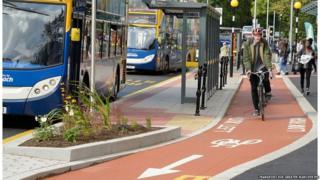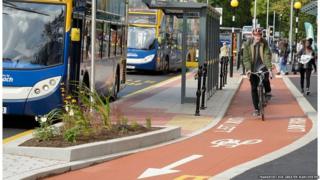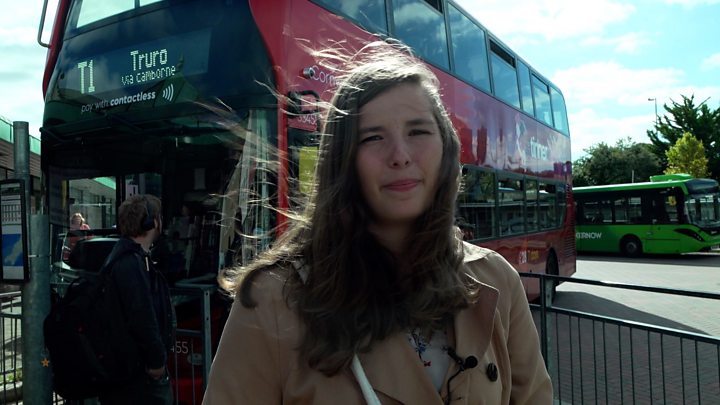Government to pledge £5bn for bus services and cycling routes
Boris Johnson says the money will improve bus services – but Labour calls the plan “unambitious”. …

 Image copyright Transport for Greater Manchester
Image copyright Transport for Greater Manchester The government is set to pledge £5bn over the next five years to improve bus and cycling services in England.
Boris Johnson will say the extra money will provide more frequent services and simpler, more affordable fares.
Chancellor Sajid Javid told the BBC these are the kind of “essential” investments that “people want to see”.
But Labour has accused the PM of refusing to reverse “£645m-a-year cuts to bus budgets, which have caused thousands of routes to be axed”.
The announcement comes as the government is set to give the go-ahead to the HS2 project.
Mr Johnson is expected to set out details of the high speed rail link and the new money for cycling and buses in a statement to the Commons on Tuesday.
In addition to improving frequency and fares, he will say the £5bn of funding will go towards new priority routes for buses and 4,000 “zero-emission buses” in England and Wales.

Media playback is unsupported on your device
Other planned improvements include:
- More evening and weekend services to make it easier for people to get around outside peak hours
- More “turn up and go” routes in which people don’t have to rely on timetables to plan journeys
- Priority schemes to allow buses to pass quickly through congested roads
In September, ministers announced £220m in extra funding to boost the bus network in England. They hope the cash will enable operators to restore recently withdrawn services, to give passengers in rural areas more choice and to increase the use of contactless payments.
Further details will be announced in a new National Bus Strategy to be published later this year.
Mr Javid told BBC Breakfast that successive governments had “let down” people, particularly in northern England, by failing to invest in “essential” local and regional transport services.
“We want to see better connectivity between our great cities, but we also want to see better connectivity within the cities and towns we all live in. How do we make that journey to work, college and university?
“That is why we are investing so much more in buses. And it is also part of our green revolution.”
‘Mini Holland’
British Chambers of Commerce director general, Adam Marshall, welcomed the funding and said: “Business communities will want to work with central government, local government and bus operators to ensure that this new funding makes a real difference on the ground.”
On cycling, Mr Johnson is expected to promise to create 250 miles of new cycle paths and plans to make cycling safer in towns by expanding projects dubbed “mini Holland” schemes.
The aim of creating “low-traffic neighbourhoods” outside of London is part of government plans to double rates of cycling by the 2025.
Campaign group the Walking and Cycling Alliance said “the emphasis on quality infrastructure is to be applauded” and that it hoped to work with other groups to “ensure that this investment is the start of a real transformation in how we get around”.
A spokesperson added: “It has never been more important to make it easier to walk and cycle – to tackle climate change, poor air quality, crippling congestion, and the mental and physical health of the nation.
“The evidence is clear and people want to do it, what has been lacking is the investment and ambition to make it safe and easy for everyone.”
Ahead of his Commons statement, Mr Johnson said: “Improving connectivity by overhauling bus services and making cycling easier than ever is such an important step forward, to make sure every community has the foundations it needs to thrive.”
But shadow transport secretary Andy McDonald said: “After years of underinvestment and cuts, this unambitious announcement is nowhere near enough to make the difference that transport users, our economy or our environment need.
“Such paltry investment in cycling won’t be enough to stop the UK lagging behind similar European nations for cycling participation.”




